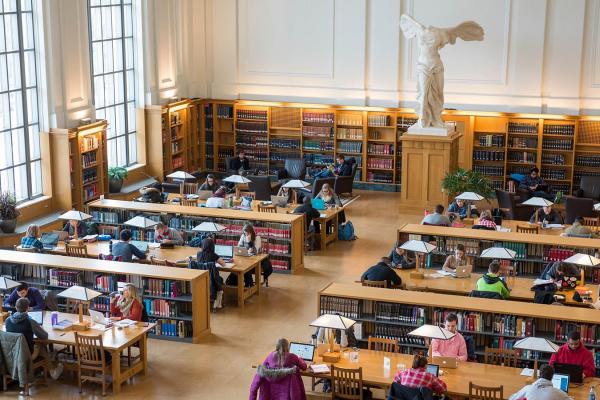The Graduate Research in Art Education Conference (GRAE) 2021

The Graduate Research in Art Education Conference (GRAE) 2021 will be hosted virtually by Teachers College, Columbia University November 12-13. GRAE features doctoral student presenters and faculty advisors from Pennsylvania State University, The Ohio State University and Teachers College with Teachers College art education doctoral alumni serving as conference respondents. The 17th annual GRAE conference aims to provide an experimental environment that can be configured and curated to support a diverse range of learning, teaching, and research activities.
The questions raised in the dissertations presented during the conference will both reflect and intensify the vibrancy of current research in the field. Just as importantly, this doctoral research—as a collection—expands the contexts in which focused inquiry in art education is now taking hold.
The Department of Arts Administration, Education and Policy (AAEP) will be represented by PhD candidates Miranda Koffey and Megan Wanttie. Continue reading for an abstract of their dissertations.
Those who plan to attend GRAE can register on the GRAE website.
Miranda Koffey
Advisor: Dr. Shari Savage
A Witch’s Craft; A Critical Study of the Witch Figure in Historical Context and Contemporary Practice

With a concentration on the contemporary witch as an active practitioner in the world, this research analyzes and critiques how the witch figure has been presented in visual culture and text from the 14th century witch trials in Europe and the United States to contemporary practice. Written in a mixed methods approach, alongside more traditional research the author discusses her experience interacting with the figure of the witch, and within the contemporary movement. As an intersectional study, the narratives of people of color, queer persons, and persons with disabilities are explored as an essential voice in order to understand how marginalized persons are disrupting the chronicle of the witch and her visual in a more critical way. Focusing attention on how the figure of the witch was constructed as a patriarchal scapegoat for societal ills, this investigation makes continual connections between the visuals created to condemn the witches throughout history, and redeem the witch in a contemporary movement constructed on intersectional feminist political action. This research explores how new perceptions of this figure are empowering, and at times ostracizing, non-males facing eerily similar traumas as their accused predecessors by analyzing several contemporary artists who use the witch as muse, or become the witch in practice.
Megan Wanttie
Advisor: Dr. Dana Carlisle Kletchka
Pandemic iteration: Constructing alternative ways of knowing & being through critical posthuman educational technology in museums

This dissertation considers the theoretical construction of posthuman educational technology in museums and seeks to explore alternative ways of knowing, being, and doing both in and outside the museum space through digital educational technology informed by Critical Posthumanism, Critical Race Theory, Critical Disability Studies, and Queer Theory. In doing so, the mechanisms of knowledge construction and dissemination within the museum are profoundly questioned with the intention of disrupting the presumed humanist, neo-liberal museum subject. Critical posthuman pedagogy can provide an opportunity for museums to re-imagine the processes that construct our definitions of what humanity is and can be – of what art, artists, viewers, and participants. Ultimately, the primary goal of this research is the decentering of the singular and constructed notion of the human from the museum narrative, which can be achieved in part through an integration of critical posthuman educational technology.
Research in the following study determines, evaluates, and considers educational technology in U.S. art museums through a wide-reaching survey and case study evaluations of the implementation of digital content creation in museums during the COVID-19 era. Beyond simply assessing what has happened in museums, this study seeks to find opportunities for greater change within the system of museum practice and education.
